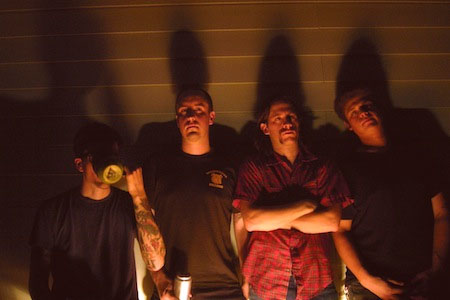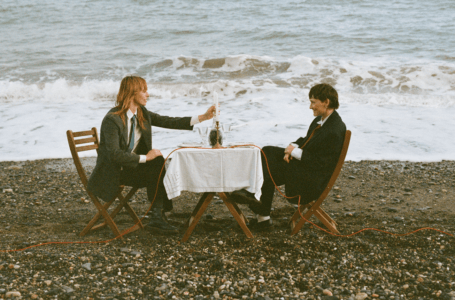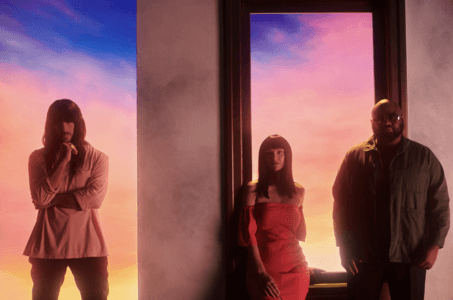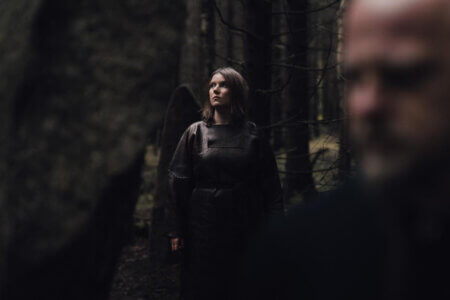The Young Interview

Charles Brownstein caught up with singer/guitarist Hans Zimmerman from Matador recording artists The Young. They talked about the album, and the curiousness of the new title: “Dub Egg”, as well as a few other entertaining topics.
CB: Tell me about making the new album. It went by pretty quickly, I think you guys were a little isolated as well.
HZ: Well, we did the basic tracks in about a week, but the rest of it took a while—massaging it and doing “things”. We started it last summer, in August, so less than a year ago, but I was also in my last
year of graduate school so I was sort of oscillating between my studies, and working on the record. So, we started really quickly and knocked out a bunch of it by recording at the cabin, and then a bunch of over-dubs and remixing here in our home practice space. A few of the cuts on the record were recorded here too, like new variations of what we did at the cabin. It’s a really small town called Vanderpool, and it’s a stretch to call it a town: there’s nothing really there. There’s like, a little town store that sells fishing bait, and bags of chips and stuff like that, but it’s a dry town too, so we had to bring in all our own groceries and booze because there isn’t anything around.
Our other guitar player, Kyle, he got me all turned on to first wave to make music, and then later dance hall and dub and stuff like that, which previous I had never taken the plunge into because I thought “nah, that’s not for me”, because I’d never tried it, but then he showed me all of this amazing music and it just blew my mind. That was a couple of years ago. Anyway, he had this dream that we were doing remixes of the record, in like a dub style, where instead of sending a __ mix out to an FX unit and folding it back in so you get those snares or vocals that keep going and going at the turn of a knob? We had, at the practice space I mentioned previously, in my backyard, we were out in the yard using a tiny little speaker—the music was coming off the tape machine through that little speaker—and the sound waves were transmitting through this little soft-boiled egg, and on the other side of the egg was this giant basket device that I guess was kind of like a microphone, but was shaped like a basket for some reason. Then that was folded back into the studio console to do these sort of dub remixes… but in the course of him telling me that dream, I kept trying to pick his brain! At this point, the record wasn’t even finished yet, and I was asking him “what did it sound like??” and he was like, “I don’t know!” I was asking him “what was the record called? What were you working on?” and he said he couldn’t
remember. So, basd on that, we figured we should obviously call the record Dub Egg, beause that’s such a weird thing to be dreaming about.
CB: Maybe it’s a symbol that you should be working with… like “Please Scratch Perry” on your next album or something.
HZ: Heh, yeah, we’d totally be into that. I mean, it’s like, all those dudes from Studio One and the producers who were doing that stuff are insane and amazing. You watch anything about them, their technique and approach to making music is so cool, because they took a little of this and that, and then made it all their own thing, out of thin air basically. They’re like these deep, well… almost like, religious guys to an extent because of the Rastafarianism, but really these deep, introspective rhythms that you can spend a lot of time soaking up, as opposed to a three-minute pop song that’s over and done with before it even started. I don’t know. I really admire people who explore rhythm like those artists do.
CB: What’s the term “casual victim pile money”? I was just curious—can you tell me about that?
HZ: Ok, so Matador released several years ago a compilation of Austin bands, and the Casual Victim Pile was an anagram for Live Music Capital, since Austin is turned over by whoever’s on city council, so it was a dark __ who curated this compilation of overlooked or off the grid bands here in town that are sort of
loosely tied by a couple of clubs, playing shows together, and stuff like that. So anyway, we had a very minimal recording budget, and they’d sent us a cheque for that, but I already had another 8-track that we’d already done a song on, so we bought this other 8-track reel-to-reel recorder off Ebay that was like, I just took a gamble on it: you know how you can either “buy it now” or make an offer on Ebay? So, this AV wholesale liquidation company had an 8-track on there… it’s actually a really great 8-track that was allegedly the same model (but not the same unit) that was used to make Nirvana’s bleach and stuff like that. It’s a cool machine. I even spotted it watching Wayne’s World: it’s in a shot in Wayne’s World, it’s really funny. I saw it was X amount of dollars, or to make an offer… I put in a really lowball offer, and then sort of explained that it’ll need to do this and this, to get it to work, and they accepted the offer and sent it to me in a crate, and I did a little TLC and Kyle did a little work soldering some stuff on it, and it totally works… and that’s a really long-winded way of saying that the money they sent us to record a song that we had already recorded, we used some of which to get more recording equipment.
CB: And that’s the picture of it on the website? Where it’s taken apart?
HZ: There’s one where we’re doing some repairs to like a blackish grey unit, and that’s the one. It’s an Atari MX 5050. That’s from the second wave of us having to open it up and do work on it. We had a
motor blow out on it, but we fixed it.
CB: So you’re happy with how the record turned out, and how it sounds?
HZ: Yeah, I am. I mean, I’m interested in home recording and stuff like that, and I’m always interested in trying to do better, so there are some things that I hear and I think “Ah, fuck.. I shouldn’t have done it that way” or whatever, but criticisms just fall on me, which is a lot easier I think than if I was listening to the record and blaming someone else, or being upset with someone else for messing around with this thing of ours, you know what I mean? It’s easy for me to obsess about something than to try and
communicate to someone else that this I want to hear, what I want it to sound like.
That said, I do have a limited technical capability and I’m not that trained in the studio as an engineer or whatever, to any extent, but it’s kind of an idea of what we wanted the record to sound like, so I read a lot of books and forums online and just did stuff like that.
CB: It’s amazing because you’ve done all this technical work and you don’t own a computer, which just amazed me when I read that, when I was reading your bio.
HZ: The whole thing is like, it was an analog experience and we kind of wanted to do that on the first record but we didn’t really have the means, as far as having a mix down deck to assemble the final mix
to get mastered, but on this one we did, ‘cause we had extra money from the recording label so we could buy an extra tape machine and stuff. Yeah, I’ve never worked musically on a computer before: I’m not saying that I never would but just that I’ve never had the opportunity… but it’s a different experience, because everything happens in real time, and you just listen. You only listen. I feel like maybe people who only make music on computers and stuff might get trapped by staring at the wave form—at the audio form that’s starting to unfold on the screen, you know? And obsess about beat-matching. Did you know they have drum replacement software? Had you ever heard of that? It seems really disgusting that you would like, have your drummer play that song and then correct his beat, and then go “hey, let’s just plug in this entire snare drum entirely”… to replace the snare drum that you hit organically with this sort of binary code approximation of a snare drum, or whatever. My issue is that, ok. Maybe I’m only talking in a rock-related context, but if you’re making synth-driven music and experimental stuff like that, then by all means it makes sense to explore this wealth of sound that exists
via software and things like that, but if you’re trying to make an unhinged rock record or something like
that, it just seems kind of phony—like you’re trying to fake out listeners with something that’s not true,
and our sort of pursuit is to have some sort of truthfulness, even if it means showing people that we fuck up, and there are mistakes, and that’s ok for us.
NT: Describe a little bit the sound of the new album, as well as signing with the legendary label, Matador Records)
HZ: I think it’s kind of like, melancholy to an extent, but it also sort of, has this sort of “sunburnt” feel, maybe? It’s kind of like, of the times because we’re still in a drought, but last year we were in this horrendous drought, all of Texas was, and I think we charted like, over ninety 100 degree days. It was
a complete oven, and everything got dusty and burnt… there was no greenery, and all the trees were cracking and falling over because they were totally dry, and it was horrible. A terrible summer. So, it kind of has that feeling a little bit, but it’s just sort of a sunny record. I guess I could describe it that way,
whereas the previous record we recorded—and I don’t need to tell you about winters in Texas—but it was recorded over two months of winter that we have in Austin, so maybe that’s sort of the differences in it. I’m not trying to say that we have harsh winters, by any means, but it was just sort of like a January grey, with not a lot of light, with rain and a lot of stuff like that.
Yeah, I wasn’t a super fan growing up, but I knew who they were, and I had bands that I was interested in on there. We were all excited about it, but we also spent a lot of time considering whether we should even do it or not, and sort of, what the long-term ramifications would be if we did this bigger move, and if they’re going to expect a lot of things from us, and how do we navigate those sorts of decisions? Or make sure that what we’re doing is what we want to be doing, what we’re happy about, and are proud of producing, you know? But they’ve been awesome, and it’s not a sort of thing where we’re in their pocket and we have to do what they want us to do, what we’re forced to do, or anything like that.
We made a video recently and they were like, “ok, we have to make a video”, and we’re like, “ok, we kind of wanted to shoot it ourselves”, and they were really hands-off about the whole thing, which is awesome, but they’re also facilitators, I guess. They’re there to take your idea and help you run with it, and I would say the same thing about putting a record together: I recorded the last record and mixed it, you know, with the band, and they at no point were like, “Ok, so you need to go into a studio for this next one”, or “have you thought about working with this producer?”. I’m sure if I would’ve said “we’re maybe thinking of going into a studio”, they may have had some thoughts for us about that, but they just let us do what we wanted to do and were there to shepherd it through the process, which was really nice.
Latest Reviews
Tracks
Advertisement
Looking for something new to listen to?
Sign up to our all-new newsletter for top-notch reviews, news, videos and playlists.









